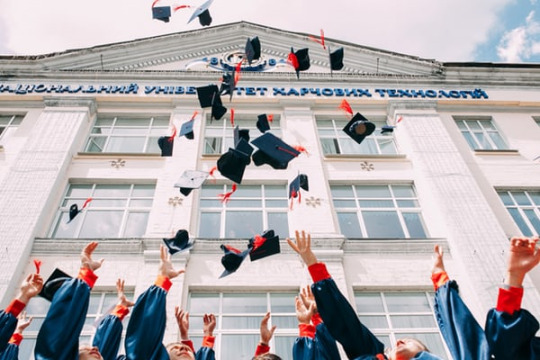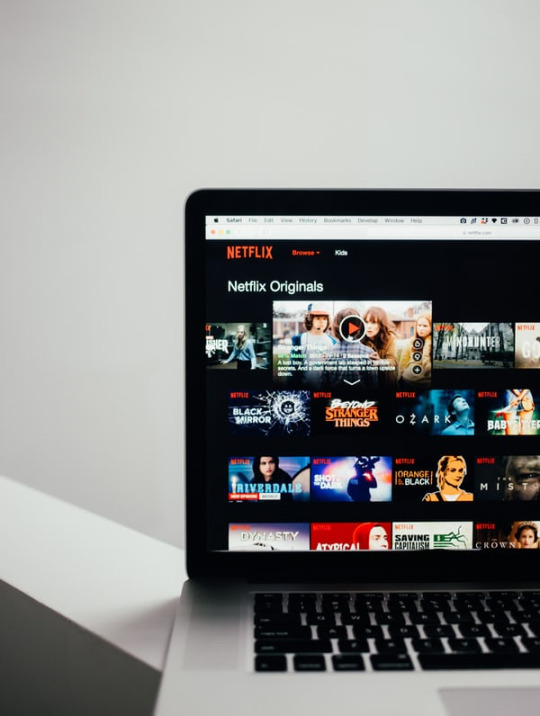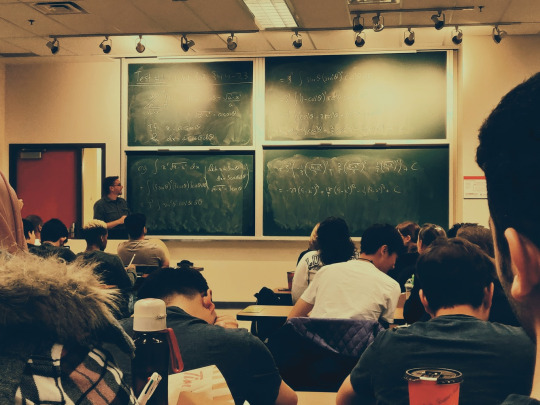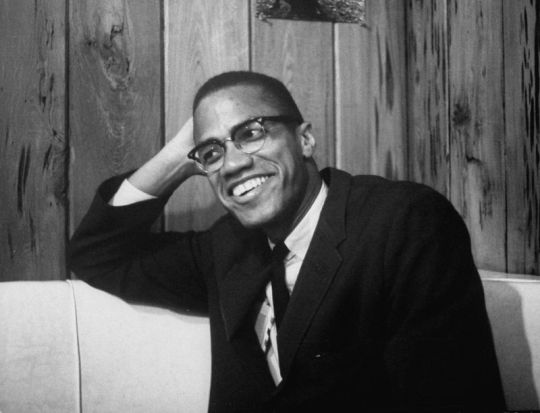Text
Why Do We Value Education?
Education. We hear the term quite frequently, but have you ever stopped to think about what all education really entails? Parents talk about the importance of their children getting a “good education” and the school system encourages its students to go on to continue to pursue their education at a university...but why? If we really dig deep we can find the various ways that education can be defined and why we put so much value on it as a society.

Students through their caps in the air at graduation as a completion of one of their forms of education (Vasily Koloda, Unsplash.com)
There is a concept constructed by Deborah Brandt, a renowned author and former professor at the University of Wisconsin-Madison, that really encapsulates the whole idea of the word “education”. Brandt has focused the majority of her career studying literacy learning and the forces that shape one’s access to learning. With this research, Brandt created the idea of a literacy sponsor. In her scholarly article called “Sponsors of Literacy”, Brandt states that "sponsors... are any agents, local or distant, concrete or abstract, who enable, support, teach, teach, model, as well as recruit, regulate, suppress, or withhold literacy-and gain advantage of it in some way”(Brandt, 72). After looking at a variety of examples, I have concluded that education is the most important literacy sponsor because it fosters positive opportunities and an improved quality of life.
Representation in the Media

With our technology evolving faster than ever, we must consider how representation can be expanded (Charles Deluvio, unsplash.com)
One of the most beneficial aspects of education is that it results in better representation in the media. When people have the ability to be educated about culture, they learn about others’ experiences, identities, and ideas which helps eliminate prejudice and stereotypes and instead facilitates a place for understanding. By eradicating certain prejudices, more opportunities will arise for people who might not have necessarily had them in the past. Education in this sense can occur in the traditional school setting, but it does not necessarily have to. The media has often neglected to focus on minority groups, and when they do they often only portray negative stereotypes. This experience was demonstrated in the story Grassroots Literacies: Lesbian and Gay Activism and the Internet in Turkey by Sercan Gorkmli. Gorkmli writes about the experiences of his friend Unal- a young gay man growing up in Turkey. Unal’s parents had negative views about his sexuality because they were uninformed about homosexuality due to the lack of representation of the LGBTQ+ community in the media at that time. Gorkmli describes how “Unal emphasized the influence of mass media, specifically television, on his parents’ misconceptions about homosexuality: To put it simply, they had never seen it before….There were only two examples...Bülent Ersoy [a male-to-female transsexual] and Zeki Müren [a queer male singer]” (Gorkmli, 2). As we have seen in the United States , representation of the LGBTQ+ community has drastically increased as education in schools, in communities, and online has increased over the past 50 years. In turn, the greater representation across media platforms can act as a form of education for others generating a positive cycle. This kind of effect can really help change the way that groups of people are treated and viewed in a positive way.
Learning Styles

Students learning from the traditional lecture style of teaching (Shubham Sharan, unsplash.com)
Just as education can help us understand each other, education can help us understand ourselves. Education is a process of self discovery, including determining one’s learning style.Understanding how you learn can drastically improve your quality of life. Amy Vidali, a current writing professor at the University of California, Santa-Cruz, explained in a video titled Being a Barrier: Thoughts on literacy and access the way that she observes different learning styles in her classroom and the way that her teaching style has changed as a result of this. Vidali explains how everyone learns differently and that many people don’t know the way that they learn best. She tells the story of a young man and his journey of discovering his learning style. “[H]e was a junior or a senior in college, probably 19 or 20, and had never been exposed to the fact that he was an auditory learner. He was excited that he had this information and could use it for the rest of his life, but I always thought about what kind of literacy opportunities did he miss and what kind of assumptions did he make about himself based on the fact that it took him until college until to realize and be able to learn how it was that he learned” (Vidali, 1). This anecdote struck me because it shows how we can perceive ourselves just because we haven’t discovered what works best for us yet. Understanding how you learn can aid you across all disciplines of life and help you make the most out of the opportunities that come your way. An understanding of ourselves increases our quality of life because we can be more efficient and confident in the ways we learn and process information. We can then go on to help others with what we have learned.
Helping Others with Education

Malcolm X, famous activist during the civil rights movement who self educated himself (Truman Moore, nydailynews.com)
Becoming educated on a subject can provide you the opportunity to help others with what you have learned and promote change in our world. I mentioned earlier how education comes in many forms and this next narrative is a prime example of that. In The Autobiography of Malcolm X by Malcolm X, Malcolm X tells the story of his self education in prison he received by reading all the material he could get his hands on. His self education while he was imprisoned allowed him to become deeply informed on African American history and that inspired him to make change in the world. Once he was released from prison he became a prominent figure in the civil rights movement. Using his acquired knowledge, he worked to improve his quality of life and the quality of life of millions of black Americans. This story teaches us two very important lessons; the first is that we need to be supportive of all forms of education and not try to suppress any kind of it. Secondly, this story shows the exponential positive effect that an education can provide. Malcolm X took his knowledge and spread it with the world therefore encapsulating the cycle of learning.
Are There Limits to Education?

Certain kinds of education can be a financial burden on an individual and/or their family (Josh Appel, unsplash.com)
There can be limiting factors to education however. A college degree comes at a cost that is unimaginable to many people. According to the National Center for Education Statistics, the average cost for a 4-year undergraduate degree during the 2016-2017 year $26,593 per year. This can be an extreme financial barrier that can be the end of the road for many people’s formal education. Nevertheless, it is important to remember that school is not the only form of education. Education can be learning other skills that are not taught in school. There are also forms of self-education like Malcolm X experienced in his life. Cost should not be a barrier in education in one’s life, you just need to seek out the opportunities that fit your situation best.
What Do We Do now?
We’ve explored how education functions as a necessary literacy sponsor, but what are the next steps? Education is often a personal matter so I want you to apply what you’ve learned in the ways that make the most sense to your life. However, I will suggest a few things. First, take ownership of your education and seek out ways to continue your learning; you never know what doors might open. Additionally, have respect for those who had a different path of education than yours. Finally, be an advocate for the education of others; help them pursue their dreams. An education may just be the thing that helps one find their place of belonging and help their social mobility. You never know so you may as well try.
1 note
·
View note